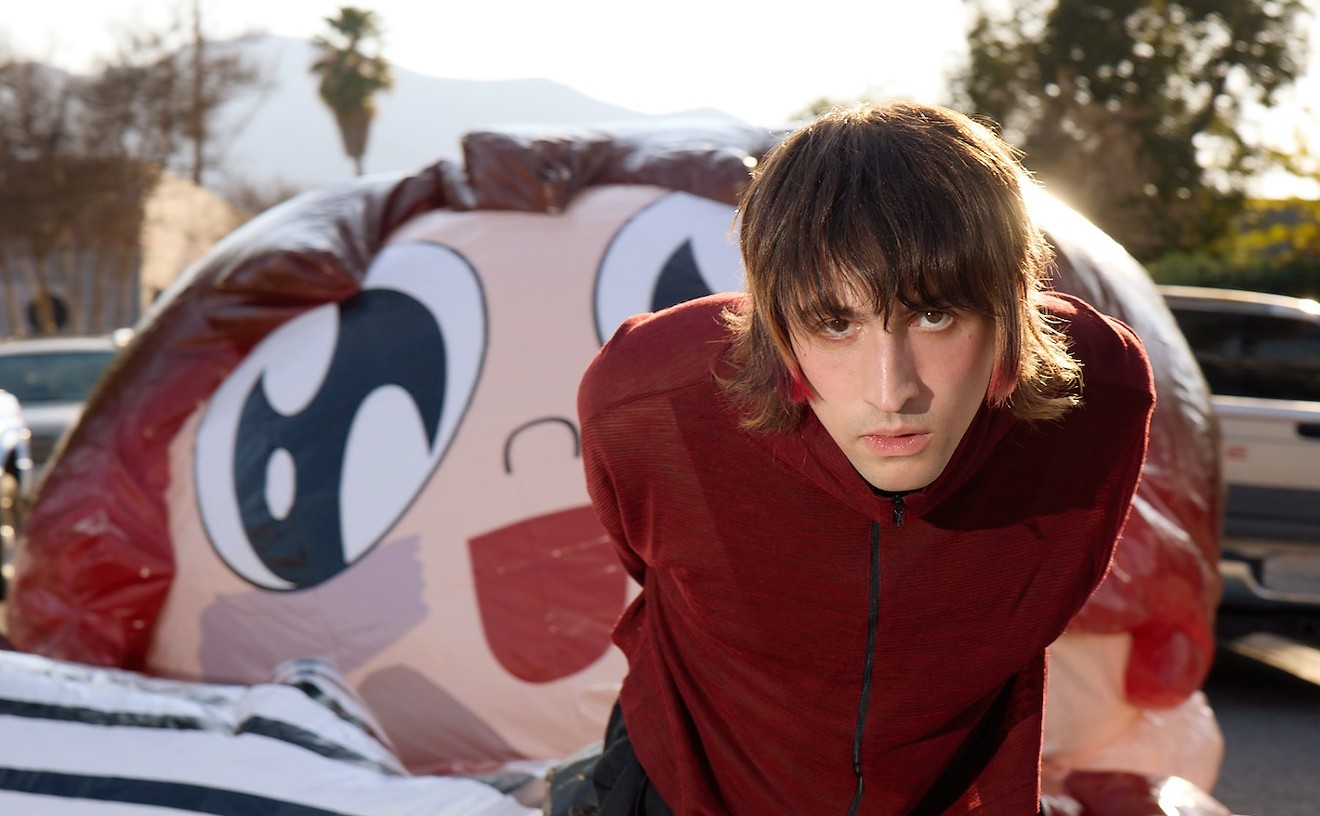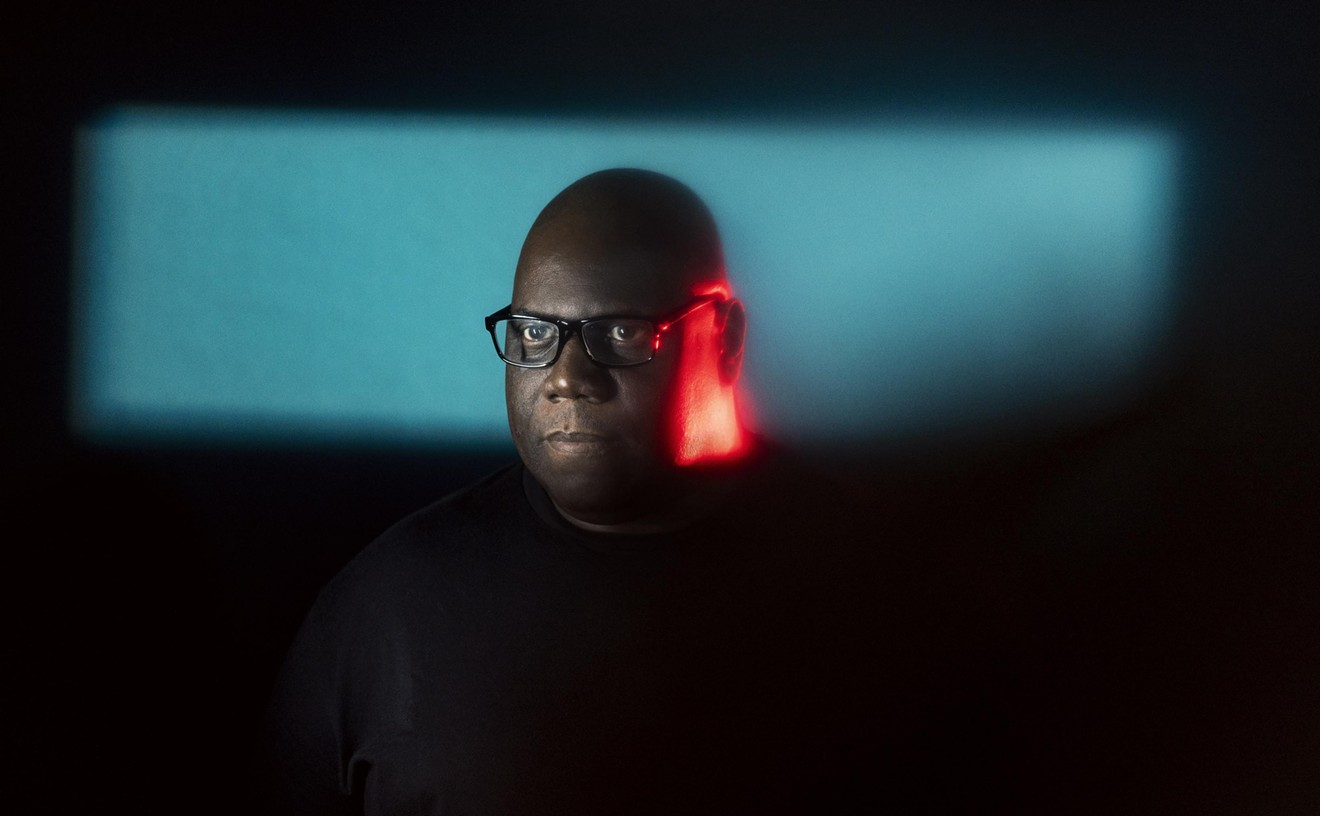"I would definitely say that a lot of the bands we've worked with have grown with us," notes Bowker. "I could draw correlations between their growth and our growth." So far about 50 full-length albums and more than 100 seven-inch releases have been recorded at Tapeworm, including material by local bands the Agency, Against All Authority, Cavity, the Crumbs, Orgasmic Bliss, King 7 and the Soul Sonics, Ed Matus' Struggle, Subliminal Criminal, Anger, Quit, the Feebles, Blind Prophet, Floor, Stun Guns, King Friday, Kreamy 'Lectric Santa, Grass Patch, Swivel Stick, and Boudet's solo project Lounge Act. And a number of bands from elsewhere in the state -- Tampa, Gainesville, St. Petersburg -- have also recorded at Tapeworm, which, du Bois points out, "is great for us, because those bands have a lot of advantages over us geographically. They don't have to travel as far to get out of state, and that puts us out there."
Tapeworm is currently recording projects by local groups Precisely Edison, Against All Authority, and the Agency. After years of working mostly with rock and punk bands, the partners say they are branching out with rap, hip-hop, and Latin music sessions. Also in the works: a recording deal with the local rap label 1210 Records. "It's nice to get other styles of music so that you're not getting burnt out listening to the same style of music day in and day out," du Bois contends. "We once had an incredible session with some Hindu musicians. The music was unbelievable, but suddenly they had to leave in the middle of a session because they didn't feel God was in the room any more. I understood that, and we continued the session the next day. As a studio, we're willing to try anything. We've put microphones on crowbars, broken bottles, had people sing with paper bags on their heads or with their pants off."
The growth of Tapeworm, now in its third incarnation, has been a surprisingly speedy one since its inception in August 1993. Originally Boudet, Bowker, and du Bois established the studio as a rehearsal space for their own bands, all of which broke up within a week of signing the lease on Tapeworm's first space in Little River. The three owned some low-fi equipment -- four-track recorders and tape decks -- on which they had been recording their practices. "We were a bunch of naive eighteen-year-olds," quips Boudet, "but we knew there was a severe lack of good budget studios." Without their respective bands, the Tapeworm partners devoted their time to fashioning a studio from scratch (devoting so much time that they all subsequently lost their girlfriends, jokes du Bois). They pooled $10,000 in start-up money, using it to pay rent and purchase basic equipment -- a soundboard, noise gates, microphones, et cetera -- from friends, pawn shops, and through the classifieds. Within a year they were joined full-time by Romeu, who had previously been lending them equipment. (Two other partners, Jules Gondar and Andre Serafini, were active in the business between 1993 and 1996. Gondar still owns a small part of the enterprise; Serafini ceased his involvement in Tapeworm, which had consisted mostly of letting the studio use his equipment, to concentrate on his own business, Beach Sound.)
"We've gone through some really rough times when we weren't sure we were gonna stay afloat," reflects du Bois. "We're a lot more stable now, but that wouldn't have been possible if it hadn't been for the support of the bands we've worked with. More than half of them stick with us and come back whenever they have a project." Adds Romeu: "We're really grateful for that, and we try to offer then the best we can -- the best equipment and the best rates. They want to see what new stuff we have every time they come back, and we want them to grow with us."
One band that keeps coming back is Against All Authority, which records all of its material at Tapeworm. "What's cool about the studio is that they keep growing with the bands -- they get better equipment as the bands get better," observes Tim Farout, AAA member and owner of the Fort Lauderdale-based indie label Far Out Records. "Jeremy [du Bois] is the best guy down here for punk bands. He's not just some guy who works in a studio and wants to overproduce everything -- he really listens to the music, and he knows what we want it to sound like." In fact, Farout and his band trust du Bois so much that they had him join them on tour as their soundman when they opened for Bouncing Souls on all of that band's Florida dates. They've also steered Far Out bands Hudson and the Crumbs toward recording their albums at Tapeworm, with du Bois at the helm.
Each partner brings with him some area of interest or expertise that has contributed to the studio's success. Romeu, who is in charge of financing and acquiring studio equipment, honed his tech knowledge while working for seven years at the now-closed Not Just Guitars music store, studied music and video business at the Art Institute of Fort Lauderdale, and has worked as a sales rep locally for various music equipment companies. Du Bois, who does the bulk of the engineering, and Boudet, who is responsible for the studio's marketing and promotions, pursued their interests in sound engineering by first working together on home equipment, then taking courses at Miami-Dade Community College, followed by internships at Crescent Moon (du Bois) and Criteria studios (Boudet).
Boudet also runs the imprint Threshold Records, which recently struck a national distribution deal with New Orleans label Big Easy and New York's Com 4; Threshold is about to release a disc by the local band Dynamo Plaza. Bowker, who coordinates projects with national bands and is responsible for the studio's public relations, is also a promoter, music writer, and recent founder of the Off the Records label, which is currently working on releases by Buzzoven, AC, and a posthumous disc by the late Mentors vocalist El Duche. All four are musicians in their own right, although the only partner currently performing is Boudet.
The past year has been a time of rapid growth for Tapeworm, which moved to new digs in October. "We did a lot of work at our old studio, but we weren't where we wanted to be," says Romeu. The studio recently added an analog two-inch, sixteen-track recorder on which the Allman Brothers recorded their hit "Ramblin' Man." It also offers state-of-the-art computer sequencing and MIDI gear, plus an extensive collection of vintage microphones, keyboards, and compressors. "We've always been a 'budget' studio as far as price is concerned, but we've always emphasized having top-of-the-line gear," notes Romeu. "All our gear and microphones are what you would find in any world-class studio, with the exception of our console, which is middle of the road. Sometimes in the past the aesthetics of the place have suffered a little, but now we're in a good area and we've been working on getting this place happening. We are happy to say that we are now a safe recording environment. You can leave your guns home."
Tapeworm's first incarnation wasn't quite so sophisticated. Bowker describes the area in which the studio was located as the scariest neighborhood ever. "One time we needed to get to the roof, and we thought, 'Man, we need a ladder,'" he remembers. "Suddenly we heard a knock and there was a guy outside, a homeless guy or something, who wanted to sell us a ladder for five bucks. It was the weirdest thing." Small and not-so-small annoyances -- rats, car break-ins and thefts, and crime in the surrounding area -- plagued the first Tapeworm. "During a particular recording session," recalls du Bois, "we went to the store, and we were stopped by police right outside the studio, telling us to get inside because there was a sniper on the roof of our building."
The space was later improved for the studio's second incarnation, which endured for two and a half years. "The acoustics weren't right, and we couldn't record properly, so we got angry; we took an ax and a cymbal stand and just leveled the place in one day," explains Bowker. "Then we spent about four months and $11,000 building the place up." (At about this time Boudet left briefly to open his own studio, but he soon returned to the Tapeworm fold.) Throughout this period the partners continued to improve the studio's capabilities and equipment, upgrading to eight-track and then sixteen-track recorders.
Accompanying this upgrading of locale and in-house technology has been an improvement in the quality of the material the partners are helping to record. "I think everything we're doing is 100 percent stronger than it was this time last year, both engineering performance on our part and the bands' songwriting and performances," claims du Bois. Boudet agrees that things are looking up. "This is the first year that a lot of the bands have taken the initiative to go out on the road," he says. "Some of the bands have been touring and have paved the way for others, but this is the first year there are about two dozen bands we've worked with that are on the road or getting ready to go on the road. Miami had a big fish/little pond mentality for a long time, but now I think the bands are aimed in the right direction."
Bowker likes to believe that a good studio, like Tapeworm, helps make for a good music scene: "In relation to us, I think bands are helped by the fact that they have a CD release or seven inches, which are more viable products to tour with than what people had when we all had bands -- the self-released cassette. You really can't tour behind the six- or eight-song cassette. But now they have CDs, and a lot of local record labels have popped up, and they can in many cases get decent distribution." By way of example, Bowker cites Far Out Records, which is now setting up distribution in Japan.
"Financially, it was tough when an unknown band or artist went out of state with nothing more than a cassette to sell," adds Boudet. "But now CDs cost so little to press that you can actually have something to sell and make it worth your while. Granted, when you first go out, you can't expect more than to break even, but you've got to take some risks. And the bands have realized that to sell some discs, they have to sound good. Before, it was, 'We got $100, let's record a CD.' Now bands spend their time and money and put a lot of effort into getting it to sound like a real record.










